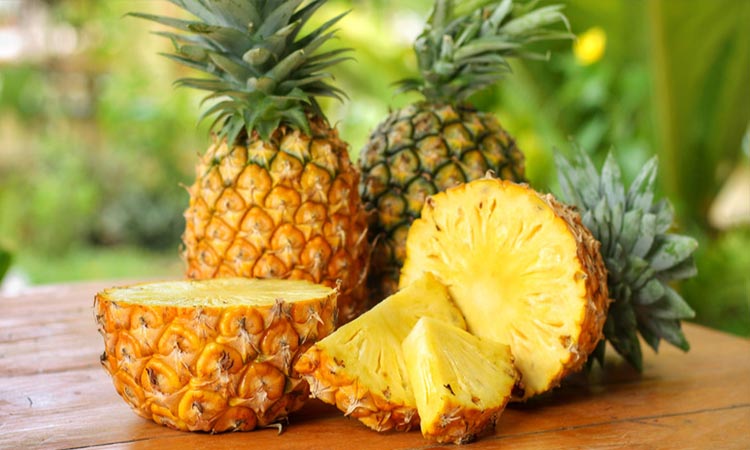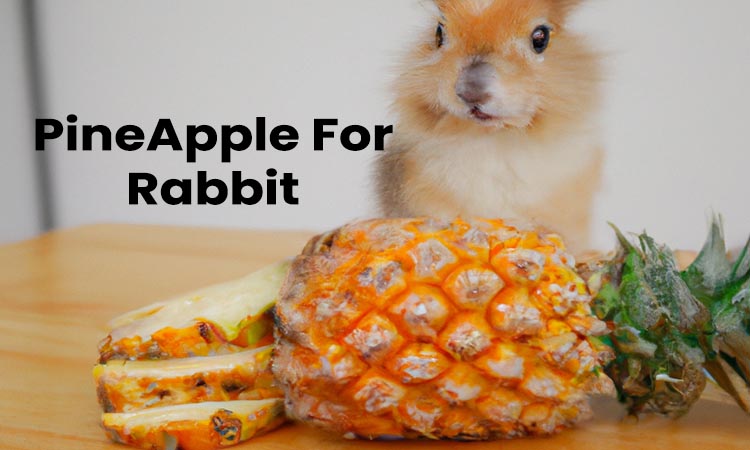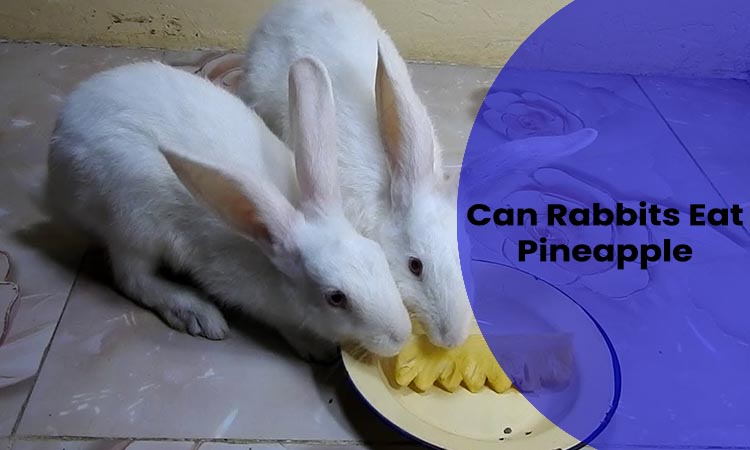Rabbits are delightful and affectionate pets that many people own in their households. These pets are also noted for being active as well as being gentle hence a hare forms a bond with the owner and is loved as a pet.
Caring for a rabbit can be quite an interesting experience in that rabbits require proper feeding and proper health care. Usually, rabbits are given hay, green veggies, and a few pellets as a part of their diet because that is essential for the strength of rabbits.
However, many rabbit owners wonder if they can occasionally treat their furry friends to fruits like pineapple. Can rabbits eat pineapple? This is a common question especially when you consider the fruit being sweet and tropical in nature. It is easy to want to feed your rabbit this sweet treat, but it is necessary to find out where it fits within their dietary requirements.
In this article, we will look at the safety of pineapples for rabbits, the nutrition that can be derived from it, and the risks that are associated with a treat including the ways that it can be introduced into their diets. In this article, you will find all the information you need to help you to feed pineapple to your rabbit.
Can Rabbits Eat Pineapple?
Yes, rabbits can eat pineapple but only in small quantities. This tropical fruit is full of useful vitamins, minerals, and sugars and therefore does not hurt the rabbits’ health too badly when enjoyed in small amounts. This fruit provides vitamins such as vitamin C for immunity, as well as dietary fiber important for bowel movements. Nonetheless, because there is high sugar content found in pineapple, pineapple should not be a daily routine of a rabbit.
Pineapple can also be harmful to rabbits, so if you want to give it to your rabbit, you need to know how to give it most effectively. Again, it is best to only feed cut fresh pineapple, taking away the tough skin of the pineapple fruit and the inner core that is usually hard and poses problems to the chewing and digestion of rabbits. It is preferable to give only a small amount and find out the reaction of your rabbit to the fruit. When giving pineapple, it has to be occasional not more than once or twice a week.
Although it may be a great pleasure to have pineapple as part of your rabbit’s diet pattern, it is always advisable to ensure that it does not take the place of other major constituents that your pet needs such as hay, greens, and a small amount of pellets. Offering this fruit on very individual occasions recalibrates the level of sugar in terms of refinement making the sugar health hazards insignificant.
Is Pineapple Safe for Rabbits?
Pineapple, in my understanding, is relatively safe for rabbits so long as it is given in moderation. It has nutritious properties since it has vitamin C, Vitamin A, and dietary fiber, among other nutrients that a rabbit may need. Generally, consuming pineapple is beneficial since it has the enzyme bromelain which enhances the digestive system in rabbits since it helps in the digestion of food.
The main problem is, however, that it has high natural condensed sugars which can be dangerous when given with no restraint. Feeding such sweet dishes to rabbits can be dangerous since it can make them obese, affect their digestion and cause problems with their teeth. The pineapple, although mild in taste, has acids that can be an irritant to the rabbit’s mouth and digestive tract when taken in excess.
To make sure pineapple bears no adverse effects on your rabbit, start with it very slowly and in moderate quantities. The dice size is a good place to start, being ready to check the reactions of your rabbit to the new food.
As a general rule, do not feed your pet with canned or processed pineapples that have sugar and other preservatives in them, only fresh ones. Most importantly, feeding your rabbit pineapple on a very rare occasion, maybe once or twice a week will be very beneficial towards the health of your rabbit without the risk of excess sugars to your rabbit.
How to Feed Pineapple to Rabbits
The practice of feeding fruit to rabbits is one that ought to be exercised with a lot of care and moderation. Whereas canned or processed pineapple does not pose a good alternative, go for fresh, ripe and healthy, pineapple instead. Otherwise, cut off the hard core of the pineapple and the rough outer skin because these are basically difficult for them to chew and digest.
Making sure to cut it into dice-sized cubes, begin by offering some small bits of pineapple, giving only one piece at a time to see your rabbit’s reaction. If your rabbit seems to enjoy the pineapple and does not experience any digestive problems whatsoever, then you can use the fruit as a treat on very rare occasions. However, with fruits containing high levels of sugar, do not give this treat more than once or twice a week.

Keep an eye on your rabbit all the time, the first time you introduce pineapple or any other new food into their diet. If you notice anything out of the ordinary, whether it is in their behavior, appetite, or the form of their droppings, it is best to stop feeding them hideously and get them to the vet. Do not forget that pineapple is a delicious and healthy morsel for rabbits but it is only that, an addition to an otherwise hay, fresh green vegetables, and limited pellet in diet.
Also Check - Can Rabbits Eat Grapes? Find Grapes Nuritional benefits here.
How Often Can Rabbits Eat Pineapple?
Pineapple should necessarily be consumed by rabbits on rare occasions, typically up to twice a week. While they are fruits whose nutritional value ought to offer vitamins, fiber and natural enzymes such as bromelain – the inclusion of such fruit is likely to be limited because of the sugar content. Too much cultivation of the pineapple fruit can cause the getters to suffer from weight gain, drop of the digestive system and improper feeding for your rabbit.
Once you make the decision to include pineapple into your rabbit’s food diet, give it in some reasonable quantity, say the size of a mini dice piece and monitor how your rabbit reacts to it. In case your rabbit seems to relish the treat without showing any signs of discomfort, then this treat can be done intermittently. However, it has to be made clear that pineapple is just a treat that can only be given as a supplement to the basic diet which involves a lot of hay, vegetables and very few pellets.
To do this, you have to restrict how often you offer pineapple treats so that your rabbit can enjoy the health benefits this tropical fruit brings without health risks. The same applies to new feeds, always take note of what your rabbit does to the new feed and do not hesitate to seek professional help if in doubt about their health or diet.
Advantages of Feeding Pineapple to Rabbits
Feeding pineapple to rabbits, when done in moderation, can offer several advantages. One of the key advantages is that the rabbit gets several vitamins, such as C and A vitamins in the case of pineapple. When it comes to enhancing one’s health and boosting one’s immune system in this case as well, vitamin C which acts as an antioxidant is most beneficial to the rabbit since it destroys all free radicals. This also extends to good skin health and better eyesight.
Pineapple, like many fruits, contains dietary fiber which is highly beneficial to the rabbit’s diet. It also helps in the peristaltic movement where the foodstuffs are propelled along in the gastrointestinal tract hence preventing such problems as gastrointestinal stasis which is life threatening to rabbits.
Less amounts of such proteins in the diets are administered to rabbits but pineapple has bromelain which is an enzyme that digests protein and eases the process of digestion in general for those who take higher protein meals.
Even though a rabbit should not usually eat pineapple often, it is good to note that this fruit can serve as an interesting and delicious treat every now and then. You can also give a piece of pineapple to your rabbit as an appreciation for following your commands or doing any other thing that pleases its heart. The art of using fruit for reward is not new and it is the most effective method towards ensuring that the rabbit appreciates doing various activities.
Nonetheless, these advantages should be weighted against the high sugar levels in the fruit, which is why Pineapple should only be offered from time to time and not a part of your bunny’s regular diet.
Disadvantages of Feeding Pineapple to Rabbits
For treating rabbits, pineapple may be a healthy and appetizing snack choice; however, there are some disadvantages that should be evaluated before it becomes part of their everyday intake. One of the main concerns is the fact that pineapple has a high level of sugar.
Because it is a high-sugar diet, rabbits’ bodies are not programmed for it, and excess consumption of sugar can also cause animals to grow obese. This is extremely dangerous because it can lead to diseases such as heart disease, joint disease and reduced life span.
Also, the tropical fruit has some acidity, which is another caveat. The acidity may not be very strong, but it can discomfort the rabbit’s mouth and even the digestive system, especially when they have it too often. In the worst cases, when the rabbit begins to link eating with pain, it may also lead to a loss of appetite.
The last major con of feeding pineapples and other soft fruits is due to their lack of fiber in comparison to hay and leafy greens. As earlier indicated, rabbits are herbivores and feed mostly on high-fiber diets so as to facilitate their digestive systems. Sustaining a diet solely on sweet fruits such as pineapples may keep out other foods that are more fibrous which might cause intestinal complications such as gastrointestinal stasis.
Last but not the least, there’s the consideration of digestive upset. Some rabbits can be prone to stomach disorders such as diarrhea following the consumption of pineapple. This is particularly so if they are introduced to such diets too promptly or in relatively large quantities.
Given these potential disadvantages, it’s important to feed pineapple sparingly and ensure that it complements, rather than replaces, the essential components of a rabbit’s diet, such as hay and fresh vegetables.

Foods Which Can Replace Pineapple
In case you are in search of a substitute for pineapple in your rabbit’s treat list, there are endless healthy options that you can opt for in such cases, without the side effect of being too high in sugar and acidity as provided by the fruits mentioned earlier. Some rabbit safe treats that can be used instead of pineapple include:
Apples (without seeds): Apples are sweet crunchy treats that rabbits love. However, you should be cautious to the core and seed the apple since these parts contain cyanide which is a rabbit poison. Give this fruit sparsely since the sugar content is relatively high.
Berries: Strawberries, blueberries, raspberries, and blackberries, are excellent fruits. This is good for snack options because they are full of vitamins and antioxidants.
Bell Peppers: Bell peppers hardly contain sugar and are rich in vitamin C; as such these treats are healthy and proper for the rabbits. Most of the bell peppers come in color. They differ in sweetness from one color to the other.
Cucumber: Cucumber is a satisfying and refreshing low-calorie snack that rabbits really love. It’s a great alternative for adding some sweetness to their diet without overwhelming it.
Carrots: Carrots are also sweet and crunchy but do not offer excessive sugar as much as pineapple. They contain a potent antioxidant, beta-carotene, which then changes to vitamin A which benefits eye health.
Herbs: Fresh herbs such as parsley, cilantro, and basil are very delicious and also contain vitamins that are vital for the body. They may be included to diversify the food of your pet rabbit.
Leafy Greens: Sugar content is low and fiber content is high in Kale, romaine lettuce, and spinach. These greens can substitute fruits as a periodic item in your rabbits’ diet.
Pumpkin: Fruits are not expected from the hottest part of summer, even pumpkin can be given as fiber but particularly in less quantity. This one has less sugar than pineapple and can be helpful for effective digestion.
Making use of these substitutes will allow you to treat your pet rabbit to many delicious and healthy snacks without compromising their nutritional standards. Last and most importantly, always make sure to add new food for your rabbit in small portions at a time.
FAQ
Can rabbits be allergic to pineapple?
Though it is not very common, some rabbits do have sensitivities to pineapple and even have allergies to it. In case of some adverse reactions in the rabbit after feeding pineapple, cease the feeding immediately and see a vet.
Can pineapple help with a rabbit’s digestion?
Pineapple has an enzyme which is soundly called ‘bromelain’ that possibly helps in the digestive process, however, the level of food offered to bunnies is very little to warrant such feeding frequently.
Can baby rabbits eat pineapple?
Rabbits less than 3 months of age should never be given pineapple. Their intestines are still maturing and thus they are still dosed with a lot of sugar which may affect the stomach.
Can pineapple cause diarrhea in rabbits?
Yes, it can, and when a lot of sugar content pineapple is fed to a rabbit especially more than they require, it provides excess sugar which most probably results in a case of diarrhea.
Are there better alternatives to pineapple for rabbits?
Yes, in addition to that, there are in fact low-sugar, healthier substitutes such as leafy veggies, berries and herbs which can be routinely offered to the rabbits without any health risks.
What are the risks of feeding pineapple to rabbits?
The principal dangers include looking obese, having digestive orders and mouth sores from the sweet and sour fruits that are pineapple.
Conclusion
Rabbits can have pineapple as a treat, but he should be cautious since this fruit is rich in sugar and can cause acidity. Pineapples do contain some nutritional factors, such as vitamins and fibers which support overall health.
However, this should not be a substitute for the basic components of a rabbit diet which includes; hay, fresh greens and pellets. Ensure the pineapple is fresh, and is in small quantities only, also, remove the skin and the core of the pineapple before giving it to your rabbit.
These instructions make it possible to feed pineapple to a rabbit and benefit the bunny without risking its health.


